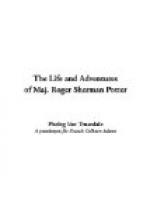CHAPTER XIV.
In which the town is thrown into A state of alarm, and sundry other things worth mentioning.
The nonresistant, resolving to make the street his castle, stood for some minutes making grimaces, and hurling coarse invective at the landlord, who, with sundry idlers, had gathered into the portico. He then took his leave, swearing to have satisfaction of his assailants, as Giles Sheridan, looking out at the window, said he should long remember the fellow for the courtesy he had manifested towards him.
Peace being restored, the landlord, his shirt ruffle in a sad plight, returned to apologize for the disturbance to his guests; while peeping in at the door, I saw Bessie, her black eyes almost swimming in tears, and evidently alarmed for my safety. Again Giles Sheridan spoke up and said: “It can be no good that brought the fellow hither. He must have been begotten under an evil star, and nursed by a virago. The fellow has but to take good care of his invective; and if he adopt the ass instead of the madman, he may in time become an excellent critic.” Here he paused, turned his head quickly, and frisked his fingers nervously through his straight, silvery hair. The clerical looking groom, hearing the little deformed man speak thus, led his young bride frightened to bed.
The lecturer now drew a much worn and almost illegible manuscript from his pocket, and commenced reading to me a few passages from it, in a clear, shrill voice, and with much earnestness of manner. His love of approbation, I saw, was only equaled by his want of self-confidence, which made him anxious to hear what I would say of it. So I listened with more than ordinary attention while he read, and then expressed a firm belief that the people of Barnstable could not fail to appreciate his ascetics. This so encouraged him that his heart seemed beating with joy, and he warmed into enthusiasm, and read on, watching intently the changes of my countenance, as if he wished to read in them my fleeting thoughts. I was about to inquire whether it were good policy to measure public taste by one’s own, when he paused, and heaving a sigh, said in a modulated tone of voice, that so many queer inquiries had been made of him respecting Crabbe, that he began to doubt whether he could interest the people in a discourse upon the character of one they had scarce heard of. No longer ago than yesterday, he said, General Sam Wheeler, the popular high school committeeman, looked in to say, that it was getting all over Barnstable, and had very nearly got into the columns of the Patriot, that he had been got down by the evil agency of the anti-temperance men to lecture on a new process of making brandy from crab apples. And the Baptist clergyman rather encouraged this report, which was doing serious damage.




